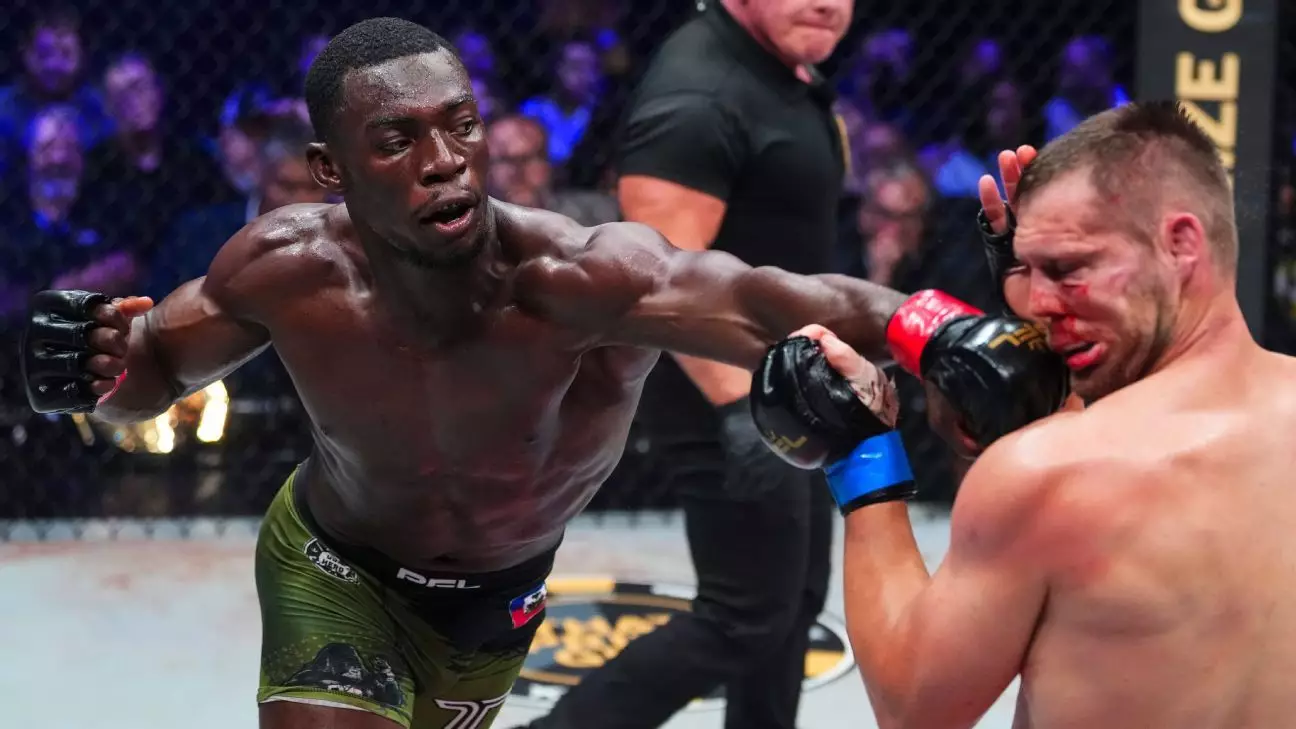In the high-stakes realm of mixed martial arts, narratives of underdog victories and meteoric rises frequently electrify audiences. The recent triumph of Thad Jean at the PFL World Finals epitomizes this phenomenon, challenging established hierarchies and spotlighting the unpredictable nature of combat sports. Despite beginning the year as a peripheral figure with limited recognition, Jean’s relentless pursuit culminated in a dramatic, unanimous decision victory over seasoned veteran Logan Storley. Such a feat underscores a vital truth in MMA: potential can materialize unexpectedly, and perseverance often outshines experience. This victory not only signifies Jean’s personal ascent but also signals a shifting paradigm where resilience, adaptability, and raw talent become critical differentiators amidst seasoned competition.
The Power of Resilience and Grit in Modern MMA
Jean’s journey to the title was anything but smooth. Facing an opponent with a storied background, including bouts with former champions and a reputation for durability, he entered the cage with a mix of determination and raw hunger. His ability to withstand an exhaustive five-round battle, maintaining focus and delivering decisive strikes in the final moments, reveals the importance of mental fortitude. MMA fighters often emphasize physical conditioning, yet the grit to endure through fatigue and adversity often determines victory. Jean’s unwavering disposition, combined with strategic striking—particularly his precise front and head kicks—enabled him to capitalize at critical junctures. This victory is a testament to the fact that in MMA, endurance, both mental and physical, can tip the scales in favor of lesser-known fighters craving recognition.
A Deeper Look at the Tactical Combat and Fight Dynamics
Analyzing the fight, it becomes obvious that Jean’s approach was rooted in calculated aggression paired with strategic striking. His ability to land powerful shots—particularly the left uppercuts and knees—highlighted his capacity to blend technique with aggression under pressure. Conversely, Storley’s gameplan leaned heavily on grappling, exploiting his wrestling background to wear Jean down. The pivot point was Jean’s resilience under submission threats, refusing to be overpowered despite fatigue. This back-and-forth exchange exemplifies the nuanced chess match inherent in MMA; fighters must balance striking with grappling, push their physical limits, and read their opponent’s tactics. Jean’s victory underscores that adaptability, paired with relentless pressure, can unseat even the most durable and experienced fighters.
Legendary Mentorship and the Cultural Significance of the Victory
A compelling layer to Jean’s win is his connection to a legendary lineage of fighters and mentors. He credited his success to the influence of Abdulmanap Nurmagomedov, the late father of Khabib Nurmagomedov, a figure synonymous with tactical grappling mastery and mental resilience. This acknowledgment amplifies the cultural importance of Jean’s achievement, rooted in a legacy of discipline and dogged perseverance characteristic of Dagestani fighters. His victory signals much more than personal glory; it symbolizes the passing of knowledge and the continuation of a fierce fighting spirit. It embodies the essence of MMA not merely as a sport but as a tradition of resilience across generations, where mentorship and cultural identity intertwine to forge champions.
The Significance of the 2025 PFL Finals and the Broader Implications
The event also showcased the dominance of fighters like Movlid Khaybulaev, further emphasizing the depth of talent within the league. Khaybulaev, with an undefeated record and an Asia-Russian fighting lineage, demonstrated that elite fighters continually elevate the level of competition. His victory by submission not only reaffirms the importance of versatility in MMA but also shifts the perspective on what it means to be a champion—combining striking prowess with tactical grappling. The ongoing PFL World Finals series exemplifies a competitive ecosystem where emerging talents challenge the old guard, intensifying the rivalry and pushing all fighters to innovate. Conclusively, these tournaments are more than showcases—they are incubators for future legends and catalysts for the sport’s evolution.
What Does This Mean for the Future of MMA?
Jean’s triumph is emblematic of a broader shift in MMA—the rise of fighters who combine grit with technical mastery rather than relying solely on experience or reputation. If history is any guide, fighters like Jean—unconventional, resilient, perpetually hungry—are velocity changes in the sport’s trajectory. They inject unpredictability, inspire new training philosophies, and force established contenders to reconsider their strategies. The sport is evolving into a narrative of perseverance and adaptability, where the fighters who embrace this ethos will shape the next chapter of MMA’s history. As fans and critics alike scrutinize these developments, one thing remains clear: in this relentless arena, victory belongs to those willing to challenge norms, push boundaries, and dare to be underestimated.

